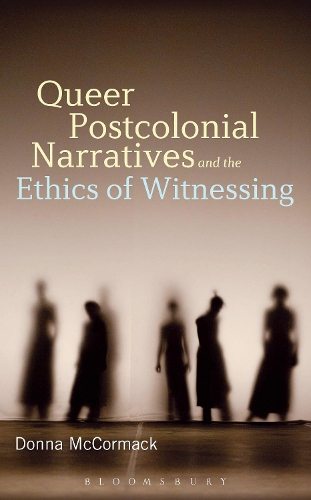
Queer Postcolonial Narratives and the Ethics of Witnessing
(Paperback)
Available Formats
Publishing Details
Queer Postcolonial Narratives and the Ethics of Witnessing
By (Author) Dr. Donna McCormack
Bloomsbury Publishing PLC
Bloomsbury Academic USA
30th July 2015
United States
Classifications
Tertiary Education
Non Fiction
LGBTQIA+ Studies / topics
809.933581
Physical Properties
Paperback
224
Width 150mm, Height 228mm, Spine 16mm
320g
Description
Queer Postcolonial Narratives and the Ethics of Witnessing is a critical study of the relationship between bodies, memories and communal witnessing. With a focus on the aesthetics and politics of queer postcolonial narratives, this book examines how unspeakable traumas of colonial and familial violence are communicated through the body. Exploring multisensory epistemologies as queer and anti-colonial acts of resistance, McCormack offers an original engagement with collective and public forms of bearing witness that may emerge in response to institutionalized violence. Intergenerational, communal and fragmented narratives are central to this analysis of ethics, witnessing, and embodied memories. Queer Postcolonial Narratives and the Ethics of Witnessing is the first text to offer a sustained analysis of Judith Butlers and Homi Bhabhas intersecting theories of performativity, and to draw out the centrality of witnessing to the performative structure of power. It moves through queer, postcolonial, disability and trauma studies to explore how the repetition of familial violence throughout multiple generations may be lessened through an embodied witnessing that is simultaneously painful, disturbing and filled with pleasure. Its focus is selected literary texts by Shani Mootoo, Tahar Ben Jelloun and Ann-Marie MacDonald, and it situates this literary analysis in the colonial histories of Trinidad, Morocco and Canada.
Reviews
This book offers a wonderfully nuanced overview of the intersection of several important critical strands in contemporary literary-cultural theory: queer, feminist, affect, postcolonial, diaspora, trauma, the body, the sensory and more. McCormack navigates between these diverse strands with elegance and verve, suggesting even more promiscuous possibilities for critical intersections while also critiquing the limits and blind spots of some approaches. * Denise deCaires Narain, Senior Lecturer in English, University of Sussex, UK *
Richly provocative and showing an extraordinary depth of scholarship, Donna McCormacks new book is an enticing text whichever way you approach it. She skilfully brings together a queering of postcolonial literature and morphological uncertainty to uncover the complex entanglements of flesh and national histories. What is demanded of the reader as embodied witness is a matter of high responsibility: an ethics of risk, as much engaged with the silent/silenced subject as with those who speak. * Margrit Shildrick, Professor of Gender and Knowledge Production, Linkping University, Sweden *
Author Bio
Donna McCormack is a Postdoctoral Research Fellow at the Centre for Womens and Gender Research (SKOK) at the University of Bergen, Norway. She has published a book chapter in the edited collection Critical Perspectives on Indo-Caribbean Womens Literature (2012). She has also published articles in The Review of Education, Pedagogy and Cultural Studies, The Journal of West Indian Literature, The Journal of Transatlantic Studies and The Journal of Lesbian Studies.
